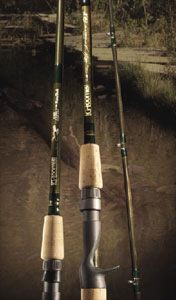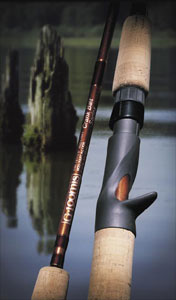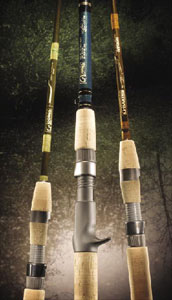IMPROVE YOUR SKILLS
Informative articles to help you better understand and utilize the Tools of the
Trade
"Back to Basic's" Vol.
2
Choosing the correct Rod for the application
In
this month's "Back to Basic's" we
will cover rods and the difference between "Action" and "Power",
and "Length" to help you determine which rod to use during
your next outing. These are general guidelines that I use to help me
perform better and catch more fish.
ACTION:
The action of your rod is how much the blank flexes from the tip towards
the butt section. Most rods are rated from slow to extra fast action.
The slower the action the more flex throughout the blank where an
extra fast action flexes nearer to the tip. Rod action is one aspect
that I would say is most over looked yet very important when matching
your bait and application. What makes the action so important is
how it will effect your casting accuracy and the action of certain
baits. With faster action rods you tend to lose casting distance
but they are more accurate. Slower action rods increase your casting
distance but you end up sacrificing accuracy. The same goes for bait
action, faster action tips decrease bait action while slower action
tips increase bait action.
 Rick's
Applications:
Rick's
Applications:
- Medium Fast Action
Crankbaits - allows the bait to have more side to
side action
Top water baits - lets the fish load up the
rod
- Fast Action
Pitching / Flipping - enough action in the tip to
project the bait
Casting - jigs, Carolina-rig
Frogs - a fast tip will allow you to cast
the frog to the back of the thick stuff
- Extra Fast Action
Spinnerbaits - accurate when targeting objects
Spot Remover / Drop Shot - spinning rod,
better hook setting with a lifting motion
Rick's
Reminders:
- Slower action for distance and bait action
- Faster action for accuracy
POWER:
The power of your rod will determine how much lifting or resistance
to flex you have in your rod. Most rods are rated from light to extra
heavy power. Lighter power rods will bend more where extra heavy
rods bend very little. Rod power is the most common way anglers choose
their rod. Rod power becomes most important when fighting fish in
different types of cover and with different types of baits. Lighter
power rods will help when using bulky baits with lots of treble hooks
where the fish has leverage to throw the bait. A lighter power rod
will help to keep the loaded on the bait. Heavier power rods help
you turn fish out of thick cover.
 Rick's
Applications:
Rick's
Applications:
- Medium Light Power
Crankbaits - small shallow running
- Medium Power
Crankbaits - small to medium, helps increase the
wobble and better for fighting bulky treble hook baits
Spinnerbaits - 1/4 to 3/8 ounce
Top Water - Poppers, Super Spook Jr., allows
for better "walking the dog" action
Spot Remover / Drop Shot - spinning rod
- Medium Heavy Power
Crankbaits - small deep diving
Spinnerbaits - 3/8 to 1/2 ounce
Top Water - Large poppers and Zara Spooks
- Heavy Power
Crankbaits - large deep diving
Carolina Rig - hook setting power
Jigs / Texas Rig - allows you to turn the fish out
of cover quicker
- Extra Heavy Power
Flipping - allows you to muscle the fish up through
thick matted cover
Rick's
Reminders:
- Lighter powers make it more difficult to move fish out of heavy
cover
- Lighter powers give you more leverage with big bulky treble hook
baits that are easy to throw
- Heavier powers give you more fish turning ability
LENGTH:
Rods come in a verity of lengths mostly in the range of 5'-6" to
7'-11". The most important choice for rod length is for
casting. Shorter rods will help with casting accuracy where longer
rods will help with casting distance. Angler height plays an important
part in choosing the correct rod length also. Don't think that
you have a to have a long rod. Shorter anglers should use shorter rods.
With the increase in rod selections, it has become easier to find shorter
rods with plenty of power for turning fish out of heavy cover.
 Rick's
Applications:
Rick's
Applications:
- 6'-6" Length
Crankbaits - targeting docks and shoreline wood
Spinnerbaits - same as above
Top Water - same as above
Note: I use shorter rods when accuracy is very important
- 7'-0" Length
Crankbaits - medium divers
Spinnerbaits - open water burning
Top Water - open water
Spot Remover / Drop Shot
- 7'-6" Length
Crankbaits - deep diving
Carolina Rig - longer sweep during the hook set
Pitching / Flipping
Rick-s
Reminders:
- I stand at just over 6 feet so a longer rod is easier to handle
when pitching and flipping
- Shorter rods make it easier to make accurate casts
- Longer rods generally allow you to play out fish better
I hope you have
found this month's "Back to Basic's" informative
and it helps you to increase your catch! For more information on the
rods offered by G-Loomis, please visit www.gloomis.com .
Visit my web site for
more Back to Basic's" articles. If you are interested in a particular
topic, send a request to rick@ricktilson.com .
Check back next month for another informative "Back to Basic's".
Copyright© Rick
Tilson. All Rights Reserved
Images provided courtesy of G-Loomis.

